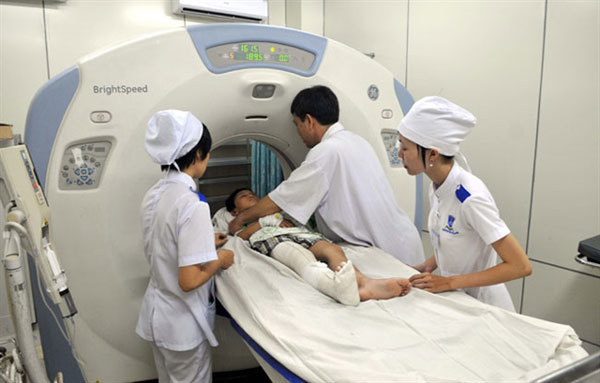 |
|
Doctors at Cho Ray Hospital in HCM City put a patient into a computerised tomography scanner. The city has invested extensively in smart healthcare development. |
Digital innovations such as blockchain, cloud-based computing, virtual health, artificial intelligence and robotics, digital reality, and the Internet of Medical Things are key to improving healthcare services, according to a Deloitte Global report titled 2019 Global Healthcare Outlook: Shaping the Future.
The report, released recently, said digital technologies could help solve today’s problems and build a sustainable foundation for affordable, accessible, high-quality healthcare.
Global healthcare spending is expected to rise at an annual rate of 5.4 per cent in 2018-22, a surge from 2.9 per cent in the previous five years, it said.
“Ageing and growing populations, greater prevalence of chronic diseases, and exponential advances in innovative, but costly, digital technologies continue to grow healthcare demand and expenditures.”
But adopting many of these innovations requires capabilities that fall beyond the traditional purview of healthcare organisations.
It is vital to build eco-systems that embrace non-traditional players and sources of knowledge outside their own four walls, experts said.
Recently HCM City has invested extensively in smart healthcare development, focusing on a healthcare big data platform and the use of IT in hospital management and expertise management.
Tang Chi Thuong, deputy director of the city Department of Health, said hospitals are required to create electronic medical records of international standard for patients.
Each citizen would have a single national patient identifier, he told a workshop on smart healthcare in the city recently.
The Thu Duc District Hospital was the first medical centre in the city to get approval from the Ministry of Health to create electronic medical records, he said.
“Many hospitals are set to follow suit.”
Since 2016, the department has been calling for the use of IT in hospital administration.
A lot of specialised software has been developed for managing medical workers, patient health records, drugs and pharmaceuticals, and health warehouses.
Many hospitals have adopted artificial intelligence to enhance their treatment quality, including robot-assisted surgery by Binh Dan Hospital and 115 People's Hospital.
Experts said in a smart hospital the software is fully inter-connected to actively support technical and professional activities and improve medical examination and treatment and hospital management.
The city recently set up the Medical Operations Centre under the Department of Health to use artificial intelligence for both operation and management.
The centre aims to spot diseases and epidemics at an early stage, and connect medical experts in Vietnam and abroad.
It also aims to improve medical services quality across the city by letting patients choose the service and doctor from home.
Nguyen Tan Binh, head of the city Department of Health, said the smart health operation centre would connect and gather data from relevant agencies, hospitals and other health facilities, and enable analysis, forecast and surveillance of diseases.
It would also help hospitals and health facilities improve their quality, he added.
The centre will link up with doctors at hospitals throughout the country besides more than 100 hospitals in 12 other countries to help improve the quality of Vietnamese doctors.
It will also integrate systems for patient satisfaction surveys, analyses of traditional and social media, connecting with the 115 emergency centre, and telemedicine.
It will help make warnings and find solutions to aid the public against the coronavirus epidemic.
It will instantly update and display occupancy rates at the city’s 47 hospitals, show the addresses of people who have contracted the new coronavirus and report on the number of confirmed and suspected coronavirus cases in the country and globally.
The city has installed cameras at 48 hospitals and connected them with the centre for health department officials to monitor emergency aid rooms. More will be installed in future.
Speaking at a recent meeting, Nguyen Thien Nhan, secretary of the city Party Committee, said on top of its own 13 million residents, the city also receives lots of patients from other cities and provinces, causing a serious overload on its hospitals.
There is great pressure on healthcare due to the fact its population is increasing by more than 180,000 a year, he said.
The city needs to invest in human resources and infrastructure and make the best of IT to improve its healthcare services, he said.
A number of other countries around the world are also facing the problem of cost pressures on the health sector due to the increasing life expectancy of people and rising costs of medical examination and treatment, he noted.
Experts said there is plenty of opportunities to improve the healthcare sector, but concerted efforts from multiple stakeholders are needed to turn it into reality. — VNS

HCM City fosters development of smart healthcare
HCM City has invested extensively in smart healthcare development, with a focus on healthcare big data platform and the use of information technology in hospital management and expertise management.

Vietnam's healthcare sector promising for private investment
The rising demand for healthcare has made Vietnam a promising destination for domestic and foreign investors.
 HCM City should invest in digital innovation and transformation in the healthcare sector to improve service quality by “making healthcare delivery more efficient and more accessible,” experts have said.
HCM City should invest in digital innovation and transformation in the healthcare sector to improve service quality by “making healthcare delivery more efficient and more accessible,” experts have said.